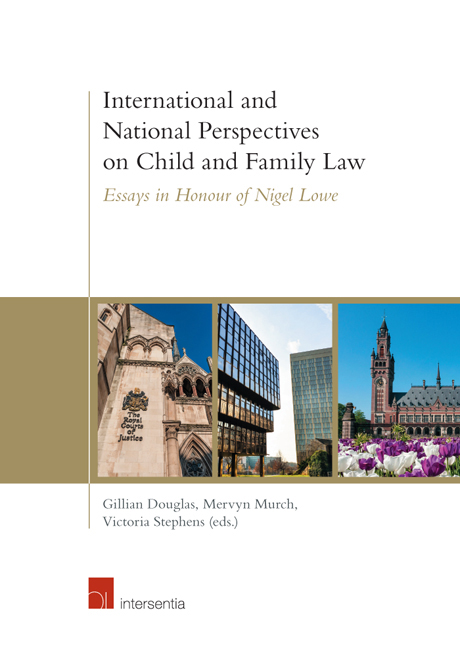Book contents
- Frontmatter
- Foreword
- Acknowledgements
- Contents
- List of Cases
- List of Contributors
- Introduction: Nigel Vaughan Lowe: An Appreciation
- Part I Family and Child Law in England and Wales
- Part II International Family Law
- Judging Parental Child Abduction: What Does it Mean to Adopt a Children's Rights-Based Approach?
- Judicial Activism: A 20-Year Evolution
- Globalisation of Adjudication in International Family Law: Serving International Families by Producing International Solutions
- Creating International Families: Private International Law and the Industry of Parenthood
- Issues in International Divorce Cases
- Non-Judicial Divorce in France: Progress or a Mess?
- The Istanbul Convention: Is Domestic Abuse Violence Against Women?
- Nationality and Migration Status in International Children's Law
- The Development of Child Protection Across International Borders for Children at Risk of Harm
- Nigel Lowe and International Family Law: An Immense Contribution
- The Spanish Constitutional Court and Protracted Child Abduction Proceedings: Time is of the Essence
- Non-Recognition of Child Marriages: Sacrificing the Global for the Local in the Aft ermath of the 2015 ‘Refugee Crisis’
- Juvenile Justice in Bulgaria: Reforms and Resistance
- Overriding Mandatory Provisions in EU Family Law Regulations
- Part III The Future for Family and Child Law
Judging Parental Child Abduction: What Does it Mean to Adopt a Children's Rights-Based Approach?
from Part II - International Family Law
Published online by Cambridge University Press: 12 October 2018
- Frontmatter
- Foreword
- Acknowledgements
- Contents
- List of Cases
- List of Contributors
- Introduction: Nigel Vaughan Lowe: An Appreciation
- Part I Family and Child Law in England and Wales
- Part II International Family Law
- Judging Parental Child Abduction: What Does it Mean to Adopt a Children's Rights-Based Approach?
- Judicial Activism: A 20-Year Evolution
- Globalisation of Adjudication in International Family Law: Serving International Families by Producing International Solutions
- Creating International Families: Private International Law and the Industry of Parenthood
- Issues in International Divorce Cases
- Non-Judicial Divorce in France: Progress or a Mess?
- The Istanbul Convention: Is Domestic Abuse Violence Against Women?
- Nationality and Migration Status in International Children's Law
- The Development of Child Protection Across International Borders for Children at Risk of Harm
- Nigel Lowe and International Family Law: An Immense Contribution
- The Spanish Constitutional Court and Protracted Child Abduction Proceedings: Time is of the Essence
- Non-Recognition of Child Marriages: Sacrificing the Global for the Local in the Aft ermath of the 2015 ‘Refugee Crisis’
- Juvenile Justice in Bulgaria: Reforms and Resistance
- Overriding Mandatory Provisions in EU Family Law Regulations
- Part III The Future for Family and Child Law
Summary
INTRODUCTION
Nigel Lowe's work in the field of international family law has been groundbreaking, not just because of his achievements in gathering, synthesising and analysing unique data on cross-border family movement over the past two decades, but because of his efforts to bring children's perspectives and experiences to bear on that process. Similarly impressive has been his success in bridging the gulf between academic scholarship and legal practice; his work is a primary reference point for any serious lawyer working on cross-border family cases.
In this chapter, we pay tribute to these efforts by analysing recent crossborder child abduction cases for their compatibility with a children's rightsbased approach to judging. It is of some regret that Nigel could not be involved in our recent Children's Rights Judgments project. This project involved over 50 children's rights scholars and practitioners who revisited 28 existing judgments involving children, from a range of different jurisdictions and legal contexts, and re-wrote them from a children's rights perspective. In the process, we identified five strategies for achieving a judgment that is more faithful to our understanding, as academic scholars, of a children's rights-based approach. First, judges can utilise to better effect the formal legal tools which give effect to children's rights, including (but not confined to) the UN Convention on the Rights of the Child (CRC). Second, a children's rights judgment can draw on scholarly insights to address theoretical tensions, conceptual challenges, and prevailing presumptions which stymie the resolution of cases in ways that best protect children's rights. The third strategy relates to the legal processes leading up to the judgment, which should maximise children's participation by endorsing and conforming with, where appropriate, child-friendly, participatory procedures. The fourth and fift h elements concern how judgments are written; their form rather than their substance. Specifically, the narrative employed should seek to centralise the child's perspective and voice; and children should be acknowledged as one of the audiences for legal judgments, such that childappropriate language, structure and style should be used, either in the primary judgment itself or in an additional ‘child-friendly’ version.
- Type
- Chapter
- Information
- International and National Perspectives on Child and Family LawEssays in Honour of Nigel Lowe, pp. 125 - 146Publisher: IntersentiaPrint publication year: 2018
- 1
- Cited by



